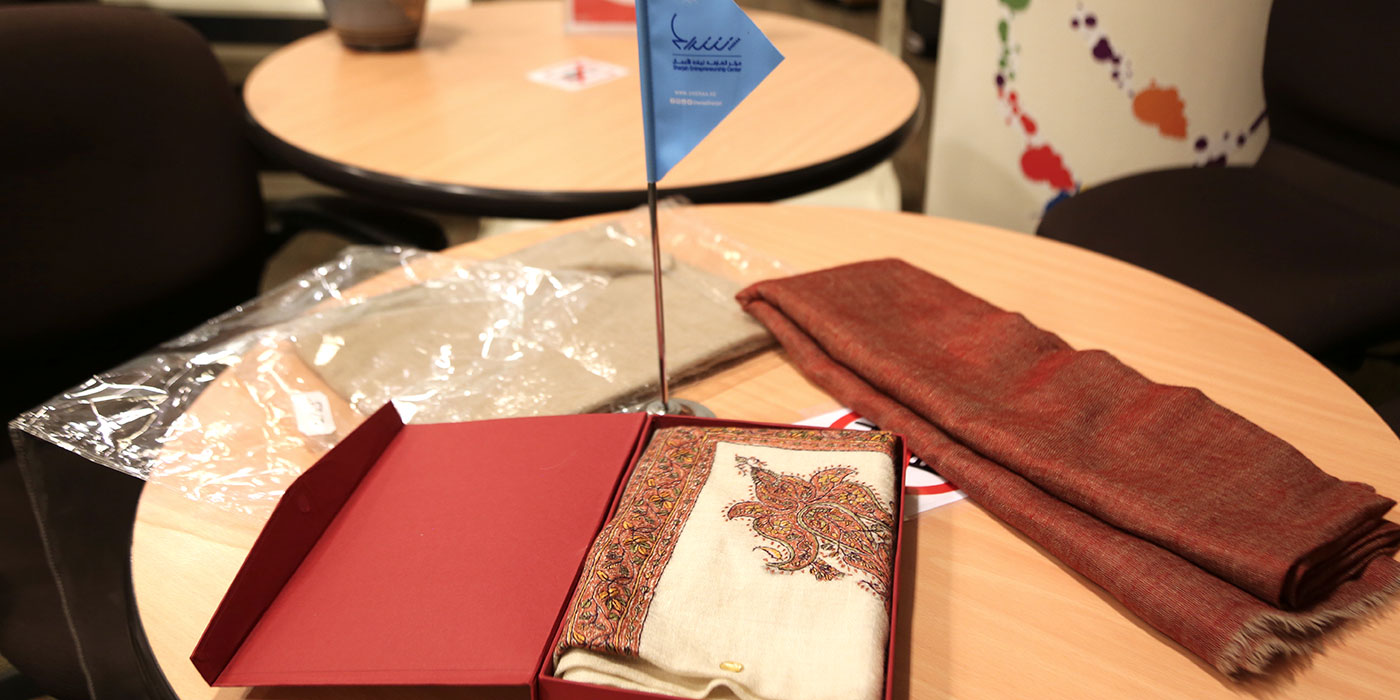The Circle of Scarf Project: A Heart- (and Neck-) warming Social Enterprise
By Naila Tariq
For most people, university courses are something that teach you what you’ll need to know for later, once you’re out in the “real world.” Till then, you move from one course to the next, storing the information for once you get a job that requires you to use it.
But what if you could make a difference now, during the course of a semester?
That is exactly what the Business Policy and Strategy, International Business, and The Internet and Marketing Communication classes did this Spring, with Sheraa as sponsor, coordinator and guide.
The Cause
As this year has been dubbed the “Year of Giving” in the United Arab Emirates, Sheraa wondered how we could give back and build a social enterprise that would help the underprivileged. Additionally, we wanted students to be involved in creating that social impact, using what they learn in their courses and still earning their grades.

The How
Enter the “Circle of Scarf” project, aimed at improving the lives of pashmina scarf-making artisans in the UAE and India by helping them earn a steady income and receive job security and benefits.
In January, Sheraa invited Yasmeen Fathima – initiator of the project – for a Social Entrepreneurship and Social Impact Talk in which she outlined the problems these artisans in Kashmir face.
Sheraa then built a structure for the project and teamed up with Professors Valerie Lindsay and Mohammed Ibahrine to make the social enterprise part of their curricula. This meant 70+ students across the three classes would be working together to help build and promote these artisans’ businesses.
The Why
According to India’s 2007-08 Economic Survey, 93 percent of working class Indians work in the informal sector, which means unregulated conditions, limited access to benefits, and living day-to- day with an irregular income. About 105 million are artisans working in Textile and Handicrafts, the second largest sector after agriculture.
The main challenges in this field are the exploitative supply chain – no labor protections, no job security, no steady income, harsh and often inhumane working conditions – the limited access to markets, the lack of technology/innovation and the traditional designs not being based on trends that make them less likely to sell.
The Gameplan
The structure set, and the classes ready, on February 13th Sheraa launched the project.
The students met project founder Yasmeen Fatima, and local entrepreneur Hidayat Hussain – who had direct contact to the artisans – through a live-stream. The students also viewed recorded video interviews of seven of the Kashmiri workers, through which they discovered exactly who they were helping and learned of the struggles the artisans face.

That was the easy part. Then the real work began.
The Business Policy and Strategy students were responsible for targeting businesses, consumers, the tourism sector, corporate gifts, branded events, and – of course – e-commerce.
The International Business students had to build custom strategies for entering the German, South African, Saudi Arabian, Australian, and Canadian markets.
And last but not least, the Internet and Marketing Communication students had to create digital marketing campaigns that would promote the artisans’ work.

The result was the first interdisciplinary, collaborative project that had real-world benefits, with 14 teams each working on their designated field.
The Journey
For three months, the teams researched potential solutions and plans that the artisans could implement to earn them job security, benefits, and a higher, more steady income. Any time they had questions, they could ask Sheraa, who would in turn get answers directly from Fatima and Hussein.
In May, each team presented their findings and proposed solutions.

The best results will be implemented into the artisans’ business model, and those who wish to take it further will join Sheraa’s Social Enterprise track as a single team working to cultivate the artisans’ craftsmanship as a social startup.
The success of this team-up has proven that it’s never too early to take what you’ve learned and make a real difference in the world, almost anywhere in the world.
SEE ALL STORIES
